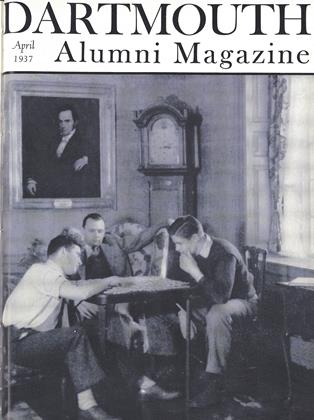Representatives of The Dartmouth asked questions, ate with the freshmen, thoroughly investigated the problem for two weeks, and presented a report which divided the controversy into three major heads and recommended improvements for each. The first grievance, that of the employees, was traced largely to the attempt to do away with the unfairness of other years by eliminating all favoritism and so-called "gravy jobs," coupled with dissatisfaction at a slight cut in the wages for overtime work. The second cause of resentment was directed against the women officials and dietitians, and resulted in mutual accusations of inefficiency, and student resentment at "dictatorial manners." The problem of sufficient food, which is the most pertinent from the freshman's standpoint, was analyzed. Undoubtedly better than in other years, calories have nevertheless failed to be a satisfactory substitute for bulk in the eyes of the students. There was felt to be too much starch, and breakfasts, although good, were felt to be monotonous. Freshmen feel themselves entitled to more than one glass of milk per meal.
Bringing the long smouldering Commons problem out into the open can hardly fail to have beneficial effects, not the least of which may be the carrying out of The Dartmouth's suggestion for a committee of freshman employees to collaborate with the management in separating petty dissatisfactions from well-founded criticisms.
Writing our last Undergraduate Chair brings the acute realization that the college year is almost over. At other times, such as in packed Webster Hall at Dartmouth Night a few weeks ago, that realization has been doubly strong. One of the greatest satisfactions in writing this column has been the personal one of getting a slightly broader and more synthesized appreciation of campus life. Others must decide if we have succeeded in presenting a fair picture of the many-faceted undergraduate year. The least we can say is that it has been fun to try.
 View Full Issue
View Full Issue
More From This Issue
-
 Sports
SportsDeaths
April 1937 -
 Article
ArticleFootball From the Inside Out
April 1937 By DAVID M. CAMERER '37 -
 Sports
SportsFollowing the Big Green Teams
April 1937 By ROBERT P. FULLER '37 -
 Class Notes
Class NotesClass of 1902
April 1937 By Hermon W. Farwell -
 Class Notes
Class NotesClass of 1927
April 1937 By Doane Arnold -
 Article
ArticleGradus Ad Parnassum
April 1937
William B. Rotch ’37
-
 Article
ArticlePRESIDENT FOR 20 YEARS
November 1936 By William B. Rotch ’37 -
 Article
ArticlePOLO PLAYERS ORGANIZE
February 1937 By William B. Rotch ’37 -
 Article
ArticleBARRAGE OF LETTERS RESULTS
April 1937 By William B. Rotch ’37 -
 Article
ArticleMILESTONES
April 1937 By William B. Rotch ’37 -
 Class Notes
Class Notes1937
NOVEMBER 1963 By William B. Rotch ’37, FRANKLIN E. ROBIN -
 Class Notes
Class Notes1937
JUNE 1965 By William B. Rotch ’37, JEROME H. LOW







